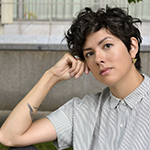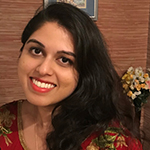Executioner Park
In my third grade playground, the Trojan Horse was a massive beast made of dark
wood and impenetrable steel.
It had smooth panels of finished oak on its sides and shiny metal rods for handlebars
that led you up the horse’s face, inside its body, through its back, and down its sides.
It was a refuge and a cage.
I remember peering through the eyes of the Trojan Horse.
My eyes seeing as the Greeks who stormed on Troy—seeing through the colonizer’s
eyes.
I used to play on the Trojan Horse with Wajma, my best friend from Afghanistan, at our
predominantly white elementary school in La Cañada Flintridge, a very affluent suburb
of Los Angeles.
We were the only brown kids in the whole school.
Wajma was a deep mahogany color and I didn’t know it then, but she was beautiful.
Did I know we were other?
Other did not have a name. I wouldn’t have known how to articulate it then, but when I
recall our musings on the Trojan Horse handlebars—all alone—in an elementary school
of hundreds of kids and more than a handful of teachers, I know we felt that we were
other.
We knew it although we did not understand it.
“When I grow up I want to be rich so I can have an operation to lighten my skin to
white,” Wajma told me as she spun around on the handlebars of the Trojan Horse. The
sun was shining on her face, creating a golden glow around her. She was wearing a
bright yellow dress that fluttered, blending delicately with the sun’s rays each time she
took a spin.
I nodded; I was intrigued. I had never heard of this operation but I knew instantly that I
wanted it.
“After I get the operation I’m gonna dye my hair blonde and buy blue contacts for my eyes,” she told me at the top of her spin.
Wajma stared at something far away. “I know I’ll be beautiful then,” she said.
I told Wajma that I also hoped to grow up and have enough money to pay for the
expensive operation and dye that would make my skin white and my hair blonde.
I, however, wanted green eyes instead of blue.
. . .
My sixth grade teacher, Mr. Lichtman, told us in class that Verdugo was a Spanish name.
That they, the Verdugos, were a very wealthy Spanish family who had owned a lot of
the La Cañada area during the California missions. He said they were the founders of
this city when it was still just land or “dirt”—as he called it.
I could almost feel my abuela’s disapproving eyes burn into my teacher.
To him and so many, the land and everything else is just dirt—something disposable,
something unclean, something empty. Until a mansion or skyscraper crushes its weight
on top of Her. Until a fist digs down deep to steal the diamonds from Her. Until someone
pays a big price to claim they own Her
Even as a child I knew Mother Earth was not just dirt; She is alive; the land is owner of
Herself.
Mr. Lichtman told us that the name Verdugo meant “executioner.”
He stood over us tall, lanky, and effortlessly cool in his faded blue jeans. His multi-
colored African print shirt had blue buttons that matched his eyes and shined like silver
bullion when the sunlight came through his classroom window, creating prisms of white
light that glowed around his face.
Mr. Lichtman stretched his tan arms, clasping his fingers on top of his slightly balding
head and sat, leaning his long frame languidly against his sturdy, old oak desk.
“You know the name of this school is “Executioner Woodlands,” he laughed, his mouth
gaped open and wide.
His teeth gleamed ivory and appeared somehow misplaced in his mouth, as if they were
slightly too large and could fall out at any time. I thought of a mouthful of polished,
sharpened bones.
I winced.
Who had the Verdugos executed?
Who had they murdered?
How did they—these Executioners—take this land?
How was it that my school was named after these murderers? How was it that
these Verdugos—these Executioners—had so much power?
. . .
My grandfather sat on the grass, leaning against a tree at the sixth grade awards
ceremony for Verdugo Woodlands. The ceremony was held a couple blocks from school
at Verdugo Park.
I was awarded Best Sixth Grade Story Writer.
“Who’s that old man?” I heard the kids from my school ask each other. “Probably a bum,” one kid answered. They all laughed.
My grandfather, who worked fourteen-hour days for seventy-five out of his eighty-eight
years of life, had fallen asleep in his brown workman’s shirt, against a sturdy oak tree.
Mi abuelo, my huito.
Who was always the one to lift the heavy boxes, to put his back into it.
Who came to this country legally as a Bracero then got deported anyway.
Who walked back across the border, “cuándo la frontera era nomás una línea de tierra,”
with only seven dollars in his pocket.
My huito.
Who worked and worked, and then worked some more.
Enough to raise eleven kids and a fatherless nieta, his little leona—me.
Who held the silence of his disappointment and anger at his unmarried daughter —who
should have been a good Catholic girl but got pregnant.
Who, a whole year later, broke his silence when he saw the ojitos of his beautiful baby granddaughter.
Mi querido abuelito.
Who worked enough to eventually become his own boss, selling Mexican goods
to stores and restaurants. Who later became the owner of his own
restaurant, his own house and apartment buildings.
But not before he worked for the railroad, worked as a gardener, worked as a cook, a
busboy, a construction worker; he worked with calloused hands, worked building things
for other men—men who did not build anything themselves, but kept everything.
Abuelo tren, quien carga la historia.
Who would lift more than his own weight with his five-foot tall frame, his childhood
and posture stunted by backbreaking labor since the age of eight.
Whose own father did not claim him, abandoning him and his mother, while she was still
pregnant.
Whose mother burned to death when her reboso caught fire while warming tortillas over
an open hearth when he was an infant.
No hay vida sin trabajo y no es buen trabajo si no tiene vida, he would tell us. There is
no life without work and it’s not good work unless it has life.
My grandfather, raised by his grandparents and his Madre Isabel (who was really his
aunt), was the only father I had ever known.
He drove me to school, picked me up, sang to me, was silent with me, danced with me,
and called me Estefana, Leona, Reyna. My papi, who snuck me pan dulce and bottles
of ¡Caramba! Mexican soda from his tortilla truck and fed me delicate morsels of food,
especially prepared for him by my grandmother, that always tasted better from his plate.
I told them I did not know who he was.
. . .
The one bedroom apartment I lived in with my mother was so tiny compared to the
immense houses—the ones with more rooms than I could count—where my white
schoolmates lived.
Their houses were the way a home should look, the way mine did not.
White and gold with sprawling driveways, like streets unto themselves. Huge, stone
steps counted the way to massive, heavy doors with immovable iron locks. These
houses in the hills far away from mine lit up with flickering lights that shined upon a
scene I could never really touch. Like families with wide-toothed smiles on 1980’s TV
sitcoms.
Families that woke up in the morning and had orange juice, milk, fruit, and waffles.
Families that had fathers. Fathers who kissed their little girls good night.
These families never had to worry.
Never had to put groceries back after flashing red lines lit up the cashier’s screen with a price that tells you and everyone:
You don’t have enough.
You are not enough.
. . .
the braid of my hair
this is my history
I am conquered and conqueror. Indian and Spanish.
Territory and the foot that marks it.
I am all of these things and beyond.
I am the cool, clear, flowing river I jump into.
Where the river becomes raging, rushing rapids
then intersects with a deep pool of serene blue.
I am the story constantly unfolding
the reflection of stars that are my past, are my present, are my future
are in the cellular makeup of me.
The ancestors that live in my hair
the dream I am dreaming,
the flower I am blooming,
the beauty I am opening crimson, amber, violet, petaled to the earth
contributing to a cycle that is much larger than the flower, much larger than the bee who drinks its nectar,
the passerby who admires its beauty,
the one who plucks it,
and the withering that eventually and inevitably takes it
back, back, back
into the earth,
all over again
. . .
Everyone was supposed to bring food for a special event at Verdugo Woodlands
Elementary School that was called, “International Day.”
All parents were invited to participate in the event. Although my family owned a Mexican
restaurant, I did not want to bring Mexican food. I pleaded with my mother not to, but she insisted.
My mom went to school and dropped off chips, beans, and salsa from the restaurant. I did not tell my classmates.
Later, my fifth grade teacher, Mr. Gould, commented about it in class. “Someone brought beans and some goood chips,” he said.
That’s how he said it. He stretched out the word good as if his mouth was savoring the
taste of each delectable chip, made from real, handmade corn tortillas and fried in a big
ollafilled with hot manteca that crackled and spat, until the chips grew tiny bubbles of heat and became hot, crispy, and delicious.
A
thousand-year old recipe of ground corn, Maize.
It was an affirmation. It was as if my teacher had whispered into my ear that I was okay
somehow, and that the whole school liked Mexican food, Mexican people, and me—
even though so many other things told me otherwise.
I smiled brightly at Mr. Gould and felt secretly proud all day.
When I got home I hugged my mother tightly and told her how happy I was that she
brought our food to International Day.
“Alex, have you heard that joke about the white guy, the black guy and the Mexican?”
“My name is Alejandra, not Alex.”
“Ale-john-dra? That’s too hard. Alex is waaay better.”
“No,” I answered. I looked down at my feet. “I haven’t.”
I was wearing the almost new white high-top Reeboks that my mom had bought me. I had just polished them with stinky white shoe polish that morning that had made me lightheaded. But I didn’t care as long as they looked brand-new.
They were gleaming.
“Ok, so there’s these three guys on a plane. One’s white, one’s black, and one’s a
Mexican. So the plane starts running out of fuel and they’re all like, ‘What’re we gonna
do? We need to lighten the load or we’re going down!’
So the black guy starts throwing out suitcases from the plane, one after the other. Then
the white guy asks him, ‘Hey man what’re you doing?’
The black guy tells him, ‘It’s okay man, we have more clothes at home.’
The white guy thinks about it and says, ‘Oh yeah.’
Meanwhile, the Mexican gets scared and kneels down and starts to pray with his eyes
closed.
All of a sudden the white guy grabs the Mexican and throws him off the plane and he
says to the others, ‘It’s okay man. We have way too many of those wetbacks at home!’’
Each time my classmates looked me in the eye and swore their “jokes” were funny.
They said these “jokes” to me all the time.
Along with the questions: Are you Spanish? Do you speak Mexican?
I knew that I was not Spanish and did not speak Mexican.
I knew that Mexican was a nationality and not a language. I knew that Spanish was a
language that Mexicans spoke. I knew that Spanish people were from Spain and I was
not
I tried to explain this. My classmates did not seem to understand.
After a while it just became easier to say, yes, when asked if I was Spanish and, no,
when asked if I spoke Mexican. After all, it was partly true.
And it seemed to sit better with them when I was something they could get a handle on;
when I was whoever they needed me to be.
They needed the box, the categories, the rigid straight lines when all I imagined were
circles.
. . .
the language of my mother rolls
off my tongue into a crescendo of silver waves
the push and pull of my tongue
against the roof of my mouth
this hum of sound and the feeling it evokes
a song of swaying palms and rolling rrrr’s
Something I remember
as old as my blood and the memory locked within
the depths of the first water
and the way I feel at times that this same tongue—
the colonizer’s tongue—
is something I have to swallow
have to bite down on this bloodied tongue—
chew it up
spit it out
make it palatable
make it presentable
and formulate my thoughts
into nice straight lines.
Lines that are already marked and cut out for me.
Lines, that if I don’t fit into them
I will cease to exist
in one part of the world.
Lines,
that if I don’t fit into them
one part of me
will
cease to exist
in every part of the world.
. . .
The universe at the Griffith Park Planetarium looks like a million threads of light tossed
in an infinite arc up into the night sky and spread out across the curve of existence.
Looks like Grandmother Spider’s massive web that She has been weaving since the
beginning of time.
Looks
like light and possibility behind my eyes closed.
Looks like dreaming. Like space and time being
stretched
folded, and unfolded, over and over, faster and faster
until it becomes a tiny, fluttering, silver origami
that is held within the hands of something bigger, something greater.
Something omnipotent.
Not seen through eyes because the eyes
are just a tiny part of it.
Looks
like lines, even.
Lines that I can draw and create.
Lines to recreate my own picture, my own silhouette
that can be stretched and formed
to create circles.
Sacred circles of tightly woven light
where I am safe, I am beautiful, and I am loved
Alejandra Sanchez writes with the intention of global and personal healing, working for the rights of Mother Earth, indigenous lifeways, and Mother Water. Her work has been featured in the independent film, I Stare At You and Dream, KPFK’s Pacifica Radio, Radio Sombra’s Red Feminist Radio, Mujeres De Maiz, La Bloga, UCLA Young Writers Anthology, Hinchas de Poesia, Duende Literary Journal, Latino/a Rising: An Anthology of Speculative Fiction and PBS Newshour’s Where Poetry Lives. She earned an MFA in Creative Writing at Antioch University, Los Angeles and is a professor of English and Chicanx Studies in San Diego, California.

 BACK TO ISSUE
BACK TO ISSUE








